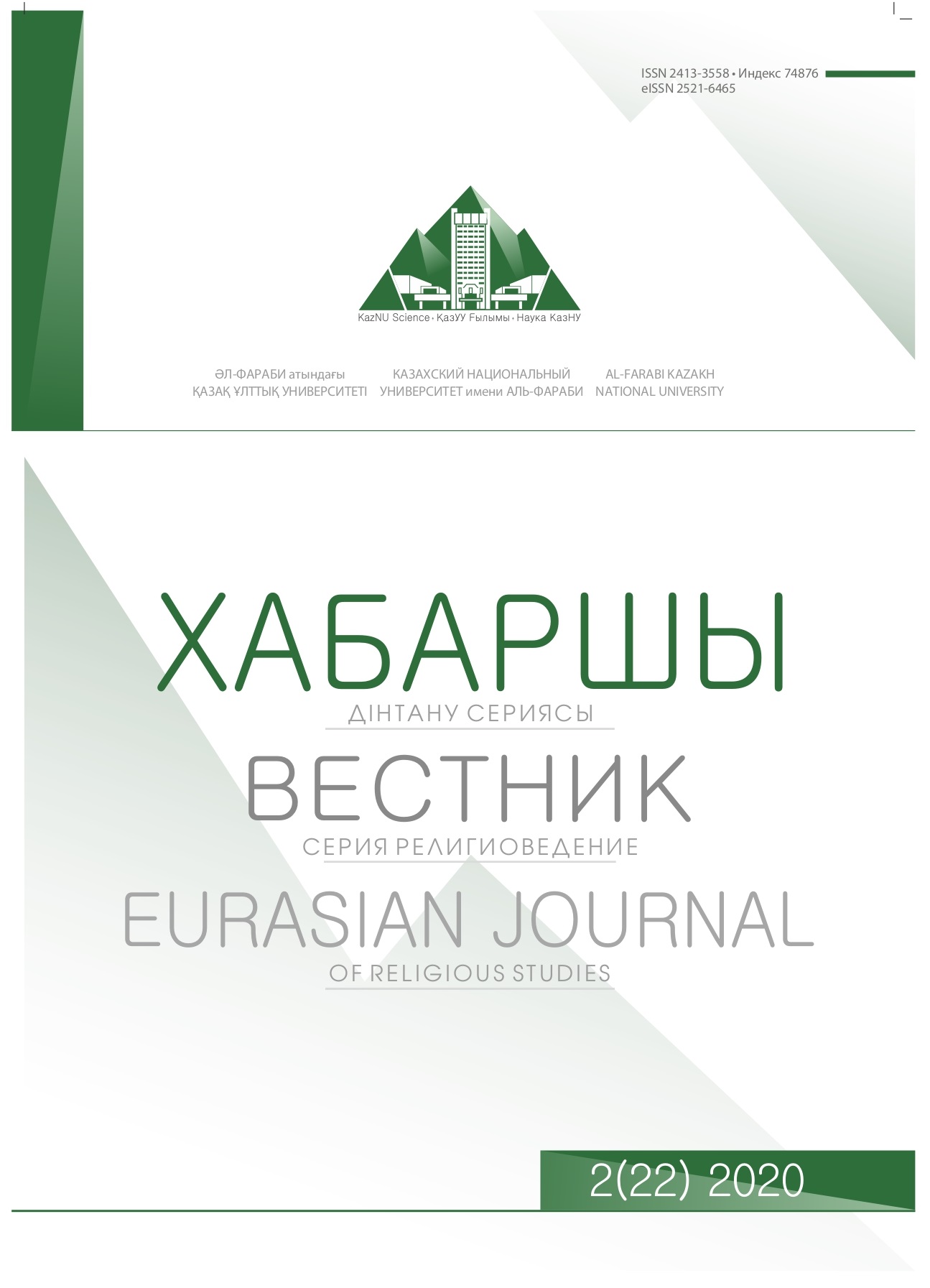Білім беру жүйесінде ұлттық тәрбиені қалыптастыру маңыздылығы
DOI:
https://doi.org/10.26577/ejrs.2020.v22.i2.r6Аннотация
Адам белгілі бір адамгершілік бағдарларды, ұлттық ерекшеліктер ескерілген құндылықтарға сүйенуді қажет етеді, шынайы өмірде ол көбіне түрлі адамгершілік бағдарлармен кездеседі. Педагогикалық теорияда моральдық тәрбиені жүзеге асыру технологиясы адам дамуының ырғағымен бірге әрдайым зерттелу үрдісінде болуы заңдылық. Олардың ішіндегі ең маңыздысы - адамгершілік тәрбиесінің көптеген мәселелерін ғылыми тұрғыдан әзірленуі жеткіліксіз деңгейде болып қала беруі. Жаңашыл педагогикалық тұрғылар негізінде тәрбие жүйесін жаңғырту жолдарын әзірлеу қажеттілігі - «Ұлттық тәрбиені демократияландыру идеясы. Ислам педагогикасына кіріспе» тақырыбында зерттеу жүргізуге мүмкіндік берді.
Мақаланың зерттеу пәні: Білім, тәрбие, әдеп ұғымдарының теориялық-тұжырымдамалық мәселелері. Тəрбие үдерісінің ерекшеліктері. Қазақстандық білім беру жүйесінің қалыптасуына әсер еткен педагогикалық ілімдер негізі мен қазіргі тәрбиенің мазмұны.
Зерттеу нысаны: жалпы білім беру жүйесінің ұлттық ерекшеліктер мен діни (ислам) тәрбие үрдісіне бағдарлануы.
Мақаланың өзектілігі: қазақ халқының ұлттық ерекшеліктерін ескере отырып, діни тәрбиенің, атап айтқанда исламның рухани-адамгершілік тұлғаның қалыптасуы мен дамуына әсері мен қазіргі білім беруде маңыздылығын анықтау.
Зерттеу обьектілері: тәрбиелеудің әдіснамалық негіздері, адамгершілік және діни тәрбие беру мәселелері қамтылған еңбектер (А.Коменский, К.Д.Ушинский, И.Гаспринский, А.В.Луначарский, Л.Н.Толстой, А.П Чехов т.б.); исламдағы белді философ, ғалым-ағартушылар (Ибн Мискауейх, Ибн әл-Муқаффаъ, Әбу әл-Хасан әл-Мәуарди, әл-Мухасиби, Ибн әл-Джаузи, әл-Ғазали т.б.) педагогикалық мұрасының талдауы берілген еңбектері; М.Жумабаев, Ш.Әлжанов, Н.К.Крупская, А.С.Макаренко, В.А.Сухомлинский, Ә.Сембаев, С.Қожахметов, Қ.Бержанов т.б. еңбектерінде көрініс тапқан моральдық тәрбие теориясының негізгі ұғымдары.
Библиографиялық сілтемелер
Абузярова Р.А, Туаева З.И. Истоки. Ислам: вероучение, мораль, культура. – Уфа: Башкирское издательство. 1996. – 133 б.
Айтжанова. Р. М. Жалпы білім беретін мектеп жағдайында этнос субьектісін қалыптастырудың педагогикалық шарттары : автореферат . – Қарағанды: (б. и.). 2005. – 30 б.
Аликберов А.К. Исламоведение как научная дисциплина. http://www.islamica.ru/islamic-studies. 2014.
Амини Ибрахим. Воспитание в исламе. – Садра. 2017. – 292 б.
Әбу Ләис әс-Самарканди. Танбихул Ғафилин. Дәру әл ибн Кәсир. – Дамаск. 2000. – 335 б.
Әл-Ғазали. Ихия Улумуд-дин, 2-том. Дәру әл-маърифа. – Бейрут. 2010. – 552 б.
Багашев А. Духовное – нравственное воспитание молодежи. //воспитание школьников, 2008. -№9. – 10-12 б.
Габидуллина Р. Воспитание детей любовью, знанием и примером//золотой родник, 2007. №6. – 36-39 б.
Джурджани. Әт-Таърифат. – Бейрут. 1985. – 413 б.
Жұмабаев М. Педагогика. Алматы. 1992. Әбиев. Педагогика. Алматы. 2004. – 286 б.
Кардави. Ю.С. Осчастливил ли запад человечество. //Саф ислам. 2005. №2. – 12 б.
Кахтани. С. У. Уделение внимания детям в исламе. М.: «Российский фонд Ибрагим бин Aбдулазиз аль Ибрагим». 1981. – 105 б.
Нысанбаев Ә. Қазақ этикасы және эстетикасы. – Астана: Аударма. 2007. – 495 б.
Педагогические воззрения Платона и Аристотеля. / Пер. С. В. Меликовой и С. А. Жебелева. Вст. статья Ф. Ф. Зелинского. – Пг.: Тип. акц. об-ва «Слово». 1916. – 62 с.
Педагогическая система К. Д. Ушинского в современном образовании / С. В. Дворниченко // Международная педагогическая школа : сб. науч. ст. – СПб. 2008. – Вып. 3. –52-58 б.
Пушкин О.Н. Как возродить нравственность? //Воспитание школьников, 2008. №6. - 66-68 б.
Степанова А. С. Понятие «Топ» в «Риторике» Аристотеля // Вестник ЛГУ им. А. С. Пушкина. 2012. № 3. – 31-39 б.
Ушинский К.Д. О народности в общественном воспитании. Журнал для воспитания. 1857, № 7, 8. – 56-81 б.
Фараби. Трактат о взглядах жителей добродетельного города // Григорян С.Н. Из истории философии Средней Азии и Ирана VII-XII вв. М.: Изд-во АН СССР, 1960. – 156-195 б.
Фролова Е. А. История арабо-мусульманской философии. Средние века и современность: Учебное пособие. М. 2006. – 199 б.
Халифа Алтай. Құран Кәрім қазақша мағына және түсінігі. Шәриф-Медина. – 1991. – 604 б.
Dewey J. Schools of the future. – Berklin. 2012. – 110 p.
Dr. Abdullah Sahin. Special Issue "Islamic Education in Contemporary World: Traditions, Rearticulations & Transformation"//Religions. 2018. 9 (11). – 335 р.
Dr. Abdullah Sahin. New Directions in Islamic Education: Pedagogy and Identity Formation// Journal of Islamic Studies, Vol. 30, Issue 2, May 2019. – 266-288 р.
Sajid Ullah, Muhammad Abid Ali. Al-Ghazali’s Aims and Objectives of Islamic Education// Journal of Education and Educational Development, Vol. 6 No. 1 (June 2019). – 111-125 р.













